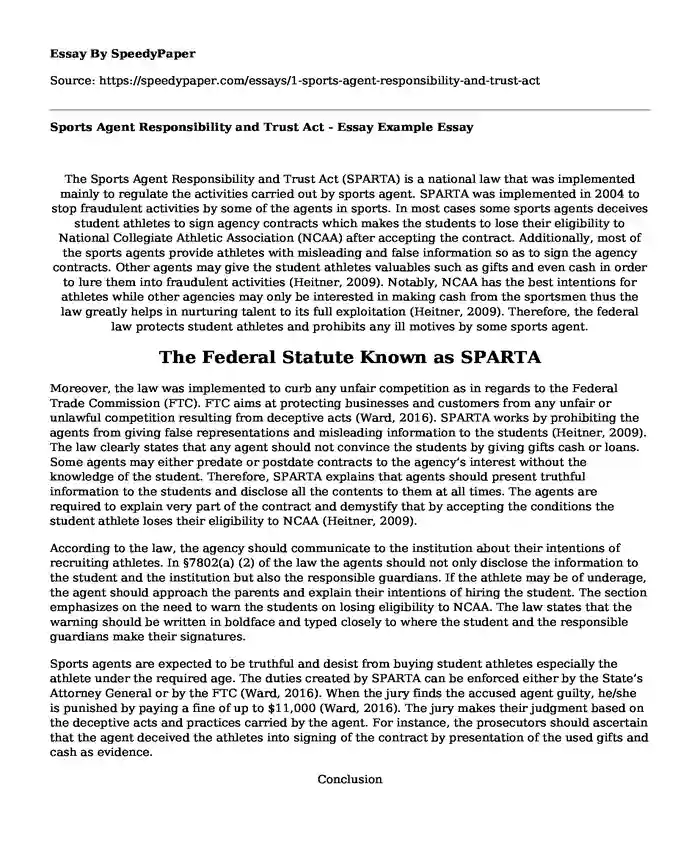The Sports Agent Responsibility and Trust Act (SPARTA) is a national law that was implemented mainly to regulate the activities carried out by sports agent. SPARTA was implemented in 2004 to stop fraudulent activities by some of the agents in sports. In most cases some sports agents deceives student athletes to sign agency contracts which makes the students to lose their eligibility to National Collegiate Athletic Association (NCAA) after accepting the contract. Additionally, most of the sports agents provide athletes with misleading and false information so as to sign the agency contracts. Other agents may give the student athletes valuables such as gifts and even cash in order to lure them into fraudulent activities (Heitner, 2009). Notably, NCAA has the best intentions for athletes while other agencies may only be interested in making cash from the sportsmen thus the law greatly helps in nurturing talent to its full exploitation (Heitner, 2009). Therefore, the federal law protects student athletes and prohibits any ill motives by some sports agent.
The Federal Statute Known as SPARTA
Moreover, the law was implemented to curb any unfair competition as in regards to the Federal Trade Commission (FTC). FTC aims at protecting businesses and customers from any unfair or unlawful competition resulting from deceptive acts (Ward, 2016). SPARTA works by prohibiting the agents from giving false representations and misleading information to the students (Heitner, 2009). The law clearly states that any agent should not convince the students by giving gifts cash or loans. Some agents may either predate or postdate contracts to the agency’s interest without the knowledge of the student. Therefore, SPARTA explains that agents should present truthful information to the students and disclose all the contents to them at all times. The agents are required to explain very part of the contract and demystify that by accepting the conditions the student athlete loses their eligibility to NCAA (Heitner, 2009).
According to the law, the agency should communicate to the institution about their intentions of recruiting athletes. In §7802(a) (2) of the law the agents should not only disclose the information to the student and the institution but also the responsible guardians. If the athlete may be of underage, the agent should approach the parents and explain their intentions of hiring the student. The section emphasizes on the need to warn the students on losing eligibility to NCAA. The law states that the warning should be written in boldface and typed closely to where the student and the responsible guardians make their signatures.
Sports agents are expected to be truthful and desist from buying student athletes especially the athlete under the required age. The duties created by SPARTA can be enforced either by the State’s Attorney General or by the FTC (Ward, 2016). When the jury finds the accused agent guilty, he/she is punished by paying a fine of up to $11,000 (Ward, 2016). The jury makes their judgment based on the deceptive acts and practices carried by the agent. For instance, the prosecutors should ascertain that the agent deceived the athletes into signing of the contract by presentation of the used gifts and cash as evidence.
Conclusion
In a nutshell, SPARTA with the help of FTC plays a major role in the protection of student athletes from fraudulent agents. The law clearly states the guidelines of recruiting student athletes which should be strictly followed by all agents. Further, the student should be careful while signing contracts and they should be made aware of the loss of eligibility to NCAA after making a contract with a sporting agency.
References
Heitner, D. A. (2009). Duties of Sports Agents to Athletes and Statutory Regulation Thereof. Dartmouth LJ, 7, 246.
Ward, P. C. (2016). Federal Trade Commission: Law, Practice and Procedure. Law Journal Press.
Cite this page
Sports Agent Responsibility and Trust Act - Essay Example. (2017, Oct 26). Retrieved from https://speedypaper.com/essays/1-sports-agent-responsibility-and-trust-act
Request Removal
If you are the original author of this essay and no longer wish to have it published on the SpeedyPaper website, please click below to request its removal:
- Free Education Essay: Technology and Literacy
- Factors That Affect the Level of Political Corruption: Paper Example
- Free Essay with the List of Methods Used in Qualitative Criminal Research
- Free Essay Sample about Dummy Variable
- Nutrition Essay Example on Paleo Diet
- Paper Example: Impact Of Education On Nursing And Its Future
- Essay Sample on Sociological Imagination and Protests
Popular categories





